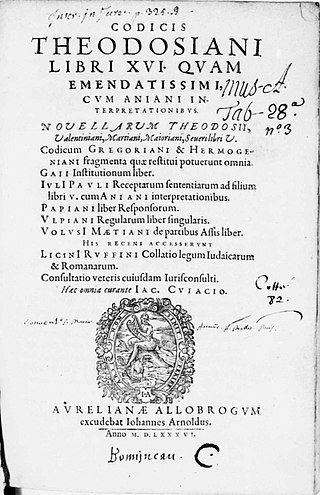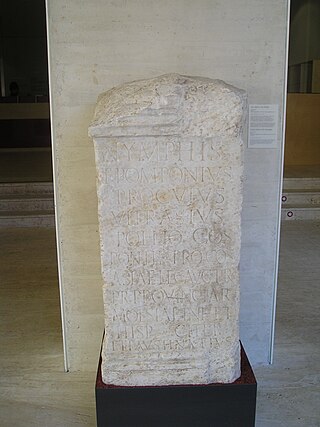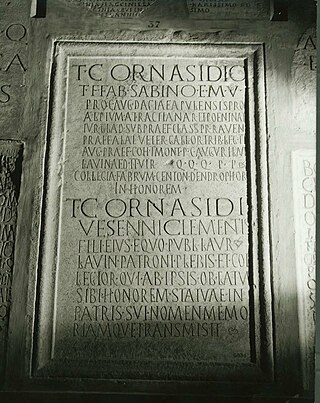Related Research Articles
Sextus Varius Marcellus was a Roman aristocrat and politician from the province of Syria. He was father of the emperor Elagabalus.
Marcus Statius Priscus Licinius Italicus was a Roman senator and general active during the reigns of Hadrian, Antoninus Pius, and Marcus Aurelius. Contemporary sources refer to him as Marcus Statius Priscus or simply Statius Priscus. He was consul for the year 159 as the colleague of Plautius Quintillus; Priscus was one of only two homines novi to attain the ordinary consul in the reigns of Antoninus Pius and Marcus Aurelius.

Lucius Volusius Maecianus was a Roman jurist, who advised the Emperor Antoninus Pius on legal matters, as well educating his son the future Marcus Aurelius in the subject. Originally of the equestrian class, Maecianus held a series of imperial offices culminating with prefect of Egypt in 161, when Marcus Aurelius adlected him inter praetorios, or with the rank of praetor, into the Roman Senate. Maecianus was suffect consul in an undetermined nundinium around AD 166.
Cornelius Repentinus was a Roman Senator who was active in the 2nd century AD. He held a number of positions during the reigns of emperors Marcus Aurelius, Commodus and Didius Julianus, which included suffect consul and Urban prefect of Rome.
Lucius Petronius Taurus Volusianus was a Roman citizen, apparently of equestrian origins, whose career in the Imperial Service in the mid-Third Century AD carried him from a relatively modest station in life to the highest public offices and senatorial status in a very few years. He may have secured his first appointments before the Licinian Dynasty – – acceded to the Empire in 253 AD, but it was in the course of their reign that his upward progress achieved an almost unprecedented momentum and the second factor seems to have been a consequence of the first. The nature of his relationship to the Licinii is uncertain, but it seems likely that a common origin in the Etruscan region of central Italy at least predisposed Gallienus in his favour and he seems to have been that emperor's most trusted servant and adviser during the period of his sole reign - 260(?)-268 AD.
Marcus Petronius Mamertinus, possibly known as Sextus Petronius Mamertinus, was a Roman senator originally of the Equestrian order. He served as suffect consul in 150 AD as the colleague of Marcus Cassius Apollinaris.

Titus Pomponius Proculus Vitrasius Pollio was a Roman senator, who held several imperial appointments during the reign of Marcus Aurelius. He was suffect consul in an undetermined nundinium around 151; he was a consul ordinarius in the year 176 with Marcus Flavius Aper as his colleague.
The gens Ceionia or gens Caeionia or the Caeionii family was an ancient Roman senatorial family of imperial times. The first member of the gens to obtain the consulship was Lucius Ceionius Commodus in AD 78. The rise of this family culminated in the elevation of the emperor Lucius Verus, born Lucius Ceionius Commodus, in AD 161.
The gens Septimia was a minor plebeian family at ancient Rome. The gens first appears in history towards the close of the Republic, and they did not achieve much importance until the latter half of the second century, when Lucius Septimius Severus obtained the imperial dignity.

The tres militiae was a career progression of the Roman Imperial army for men of the equestrian order. It developed as an alternative to the cursus honorum of the senatorial order for enabling the social mobility of equestrians and identifying those with the aptitude for administration. The three posts, typically held over a period of two to four years, were Praefectus cohortis, Tribunus angusticlavius, and Praefectus alae.

Marcus Macrinius Avitus Catonius Vindex was a Roman senator who was active during the reign of Marcus Aurelius. Originally a member of the equestrian order, Vindex demonstrated courage and intelligence that led to his award of dona militaria and elevation into the Senate, followed by his appointment to the consulate, which Géza Alföldy dates to an undetermined nundinium around the year 175.
Servius Sulpicius Similis was an eques of ancient Rome who held several imperial positions, both civil and military, under Trajan and Hadrian, culminating with praefectus or governor of Egypt from 107 to 112.
Publius Tarrutenius Paternus was a Roman eques who flourished during the reign of emperor Marcus Aurelius. He achieved several military successes, leading first to his appointment as praetorian prefect and subsequently to his adlection into the Roman Senate. Paternus was accused of treason by Aurelius' son and successor Commodus, and executed.
Marcus Gavius Maximus was an eques of ancient Rome who held several imperial positions, both civil and military, under Hadrian and Antoninus Pius.
Marcus Macrinius Vindex was a Roman eques who held a number of senior positions during the reign of the Emperor Marcus Aurelius, including praetorian prefect.
Quintus Baienus Blassianus was a Roman eques who held a number of military and civilian positions during the reign of the Emperors Antoninus Pius and Marcus Aurelius, including praefectus of the Classis Britannica, and of Roman Egypt.
Gaius Valerius Eudaemon was a Roman eques who held a number of military and civilian positions during the reigns of the Emperors Hadrian and Antoninus Pius, which includes praefectus of Roman Egypt. He is known as a close friend of the emperor Hadrian.
Titus Furius Victorinus was a Roman eques who held a number of appointments during the reigns of the Emperors Antoninus Pius and Marcus Aurelius. The most prominent of these offices were praefectus vigilum, praefectus or governor of Roman Egypt, and praetorian prefect.

Lucius Julius Vehilius Gratus Julianus was a soldier and an eques who held a number of military and civilian appointments during the reigns of Marcus Aurelius and his son Commodus. Julianus received honors two separate times for his military service.
The praefectus vigilum in English prefect of the watchmen, was, starting with the reign of the Emperor Augustus, the commander of the city guards in Rome, which were responsible for maintaining peace and order at night, a kind of fire and security police.
References
- ↑ Birley, Marcus Aurelius: a Biography, revised edition (London: Rutledge, 1999), p. 156
- 1 2 Dio, Romanika Historia, LXXI.5
- ↑ Kłodziński, "Equestrian cursus honorum basing on the careers of two prominent officers of the Emperor Marcus Aurelius", In Tempore, 4 (2010), p. 4
- ↑ CIL VI, 1599
- ↑ CIL XIV, 4500
- ↑ Guido Bastianini, "Lista dei prefetti d'Egitto dal 30a al 299p", Zeitschrift für Papyrologie und Epigraphik , 17 (1975), p. 297
- ↑ O. W. Reinmuth, "A Working List of the Prefects of Egypt 30 B.C. TO 299 A.D.", Bulletin of the American Society of Papyrologists, 4 (1967), p. 99
- ↑ CIL IX, 2438
- ↑ Birley, Marcus Aurelius: A Biography, p. 181
- ↑ Birley, Marcus Aurelius: A Biography, p. 171
- ↑ Fergus Millar, The Emperor in the Roman World (Cornell: University Press, 1992), p. 308
- ↑ Birley, Marcus Aurelius: A Biography, p. 197
- ↑ Birley, Marcus Aurelius: A Biography, p. 207